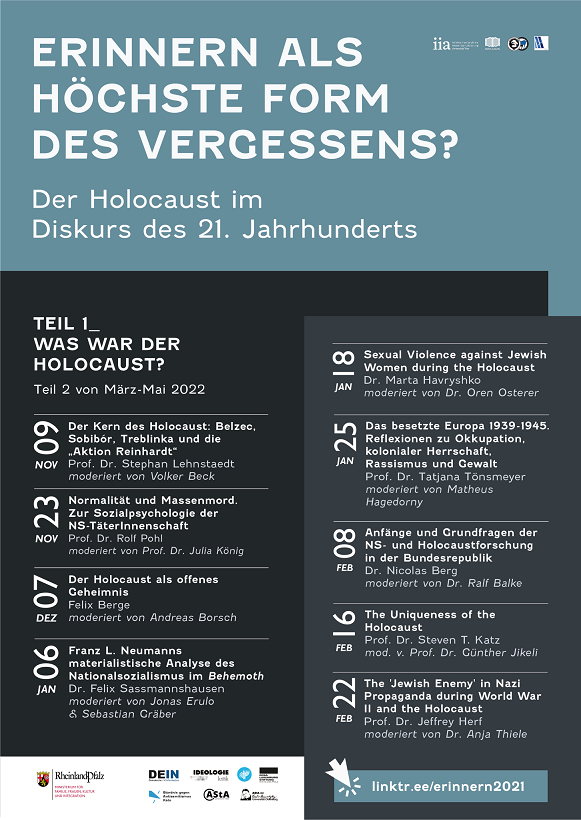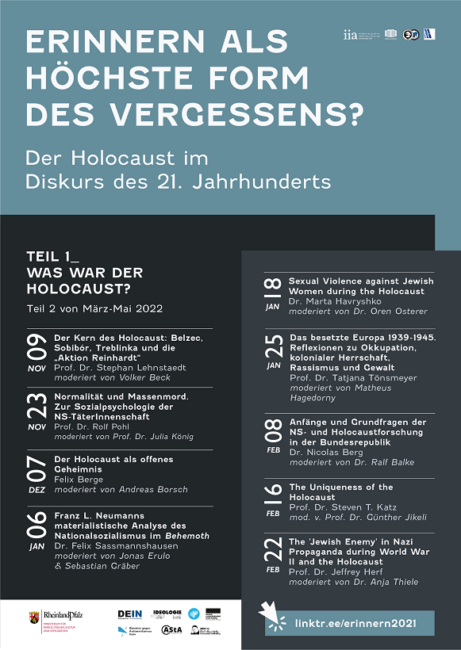Der lange Arm der Mullahs
Irans Einfluss in Deutschland
Vortrag
As Raul Hilberg argued, “The road to annihilation was marked by events that specifically affected men as men and women as women”. Both sexes during Shoah were subjected to similar forms of persecution and violence – abuse, forced labor, starvation, deportation, humiliation, and death but only women had to cope with pregnancy, abortions, invasive gynecological examination. The vast majority of rape victims and survivors during the Holocaust are women. Some forms of degradation – for example hair shaving, forced undressing and genital inspection produced feelings and meanings that differed from those of men due to socialized gendered roles and expectations. Those acts threatened men’s security rather than were associated with sexuality or sexual humiliation.
The presentation examines how the gender of Jewish women, their race and identity combined with genocidal conditions made them extremely vulnerable to different forms of sexual violence such as forced nakedness, sexual tortures, medical experiments, rape, forced abortions, and sexual slavery perpetrated by the Germans, their allies, local collaborators and civilians in the Nazi-occupied territories. Using a wide variety of prime and secondary sources, this presentation adopts a grassroots perspective to examine gender-based violence and bodily experiences as one of the most traumatic dimensions of Jewish women’s everyday life during the Shoah. The aim of the presentation is to provide space for the voices of women who were subjected to these traumatic experiences. It focuses on the effects of sexual violence on women such as physical pain, sexually transmitted diseases, unwanted pregnancy, emotional damage, post-traumatic stress disorder, loss of personal dignity, security, believes and self-determination. It explores the variety of strategies employed by the women to cope with the situations in which they were reduced to objects of sexual exploitation, as well as complex reasons of silence behind rape experiences. The presentation highlights the political significance of sexual assault against Jewish women during WWII perpetrated by various actors and argues that sexual violence was not only an intrinsic part of the Holocaust (genocidal violence) but a by-product of the dehumanization process of genocide.
Marta Havryshko is a historian of women's and gender history of the Second World War and the Holocaust. She is a Research Associate at the I. Krypiakevych Institute of Ukrainian Studies of the National Academy of Sciences of Ukraine. She is the author of the book "Overcoming Silence: Women's War Stories" (Kharkiv, 2019, in Ukrainian) and numerous book chapters and articles about women's experiences of WWII.

Die Veranstaltung ist Teil der Reihe Erinnern als höchste Form des Vergessens?
Irans Einfluss in Deutschland
Vortrag
Vortrag
Buchvorstellung
Der „progressive“ Angriff auf Israel, Judentum und Holocausterinnerung
Buchvorstellung
Wie das Völkerrecht gegen Israel missbraucht wird
Vortrag
Wie das Völkerrecht gegen Israel missbraucht wird
Buchvorstellung
Wie das Völkerrecht gegen Israel missbraucht wird
Vortrag
Sklaverei, bürgerliche Gesellschaft, Nationalsozialismus - und heute?
Bildungsurlaub
Philosophische Perspektiven auf das gute Leben
Bildungsurlaub
Geschichte und Gegenwart des Judenhasses
Bildungsurlaub

Die Veranstaltung ist Teil der Reihe Erinnern als höchste Form des Vergessens?
Mitglied werden: vorstand@kritischebildung.de